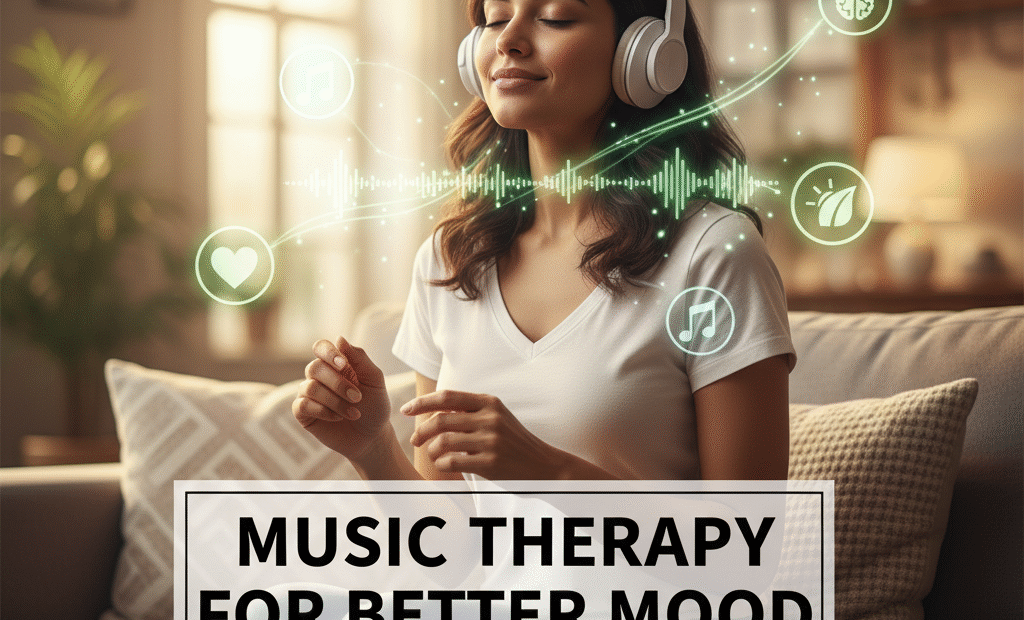Music Therapy for Better Mood
Music has the power to touch our emotions in ways that words alone cannot. Whether it’s the soothing sound of a piano, the rhythm of drums, or the melody of your favorite song, music can shift how you feel almost instantly. Music therapy uses this power intentionally to help people improve their mood, reduce anxiety, and even enhance mental clarity. It’s not just about listening—it’s about connecting with music as a form of healing.
What Is Music Therapy?
Music therapy is a form of treatment that uses music to address emotional, psychological, and physical needs. It is guided by a certified music therapist who tailors sessions to an individual’s goals—whether it’s managing stress, boosting motivation, or improving self-expression. Unlike simply listening to a playlist, music therapy is a structured process that can involve singing, composing, moving to music, or reflecting on lyrics.
How Music Affects the Brain
When you listen to music, your brain releases chemicals such as dopamine and serotonin—both known as “feel-good” hormones. These chemicals improve your mood, enhance focus, and create a sense of pleasure. Rhythmic patterns in music can also help synchronize brain waves, leading to relaxation and reduced anxiety. This is why slow, steady beats are often used to help people calm down or fall asleep.
Benefits of Music Therapy for Emotional Well-being
1. Reduces Stress and Anxiety
Listening to calming music can lower cortisol levels—the hormone responsible for stress. Classical, ambient, or instrumental tunes can help slow down your breathing and heart rate, easing both mental and physical tension.
2. Lifts Mood and Energy
Upbeat songs trigger dopamine release, promoting happiness and motivation. This is why many people turn to their favorite energetic tracks during workouts or when they need an emotional boost.
3. Improves Sleep Quality
Soft instrumental music or natural soundscapes before bedtime can help regulate sleep patterns. Music slows down your nervous system and prepares your mind for rest.
4. Encourages Emotional Expression
Music allows people to express feelings that are difficult to put into words. Writing lyrics, humming, or playing an instrument helps release emotional tension and fosters healing.
5. Enhances Focus and Productivity
Studies show that moderate, rhythmic background music can improve concentration and memory retention. It helps your brain stay alert while reducing distractions.
Types of Music Therapy Techniques
- Active Music Therapy: Involves creating or performing music—singing, playing instruments, or improvising.
- Receptive Music Therapy: Focuses on listening to carefully chosen music while reflecting or meditating.
- Guided Imagery with Music: Combines music with visualization exercises to evoke positive mental images.
- Songwriting: Helps individuals articulate emotions through lyrics and melody creation.
How to Use Music for a Better Mood at Home
- Create playlists that match different emotions—relaxation, energy, or focus.
- Listen to slow instrumental music during stressful moments.
- Start your morning with uplifting or motivational songs.
- Try humming or singing to release tension.
- Use music during meditation or yoga to deepen mindfulness.
Choosing the Right Type of Music
Different genres affect people in unique ways. Classical music promotes relaxation and concentration, while pop and rock can energize and uplift. Nature sounds—like rain or ocean waves—are excellent for reducing anxiety. It’s important to explore and find what resonates with your emotional state.
When to Consider Professional Music Therapy
If you experience ongoing anxiety, depression, or emotional trauma, working with a licensed music therapist can be beneficial. They can design structured sessions that target specific goals and track your progress over time.
Conclusion
Music therapy offers a simple yet powerful path toward better mood and mental well-being. Whether guided by a therapist or practiced at home, the key is to engage with music mindfully. From soothing sounds to energetic beats, every rhythm holds the potential to heal. So the next time you feel stressed or low, press play—let the music help you rediscover balance and joy.









